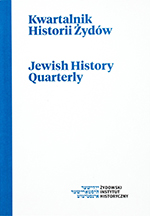Władza komunistyczna zrewidowana. Wokół książki Hansa Christiana Dahlmanna.
Communist Rule Revised. The Debate over Hans Christian Dahlmann’s Book
Author(s): Helena DatnerSubject(s): History, Political history, Jewish Thought and Philosophy, History of Judaism
Published by: Żydowski Instytut Historyczny
Keywords: March ’68; Institute of Experimental Physics; Institute for Nuclear Research; antisemitism
Summary/Abstract: The starting point for the article is the book by Hans Christian Dahlmann on antisemitism in March 1968 in Poland. His analyses reveal a fresh historical look. From the factographic point of view, the mini-monograms describing the developments in two research institutes: the Institute for Nuclear Research and the Institute of Experimental Physics of Warsaw University, are particularly valuable. The author points to the autonomous role of antisemitism and the grassroots nature of ousting Jews from jobs, the mechanisms of conformism that guaranteed the effectiveness of the antisemitic campaign, and to the possibility of refusal to join in it, as confirmed by what happened in the Institute of Physics. Dahlmann’s work is also an important contribution to the revision of the understanding of „Communist rule” started by Joanna Tokarska-Bakir. From the outset of People’s Poland, the “Communist party” as the ruling party attracted extreme nationalist and fascist elements; in March they could suddenly speak in full voice in the press. The author points to the understanding between the nationalist wing of the PZPR, which firmly held the upper hand in the party since October ’56, and the champions o pre-war fascism and post-war antisemitism. This was not just a marriage of convenience: both these components of the ruling camp were united by political realism of national-democrat origins, antisemitism or the cult of authoritarian rule. Dahlmann also checked whether the protesting students condemned antisemitism in their resolutions and notes that for the most part they were not interested in it. The author notes that when Dahlmann revises the concept of a society that allegedly always and in every respect opposed the authorities, spares his criticism of the elites – the intellectuals (writers) and the Church.
Journal: Kwartalnik Historii Żydów
- Issue Year: 270/2019
- Issue No: 02
- Page Range: 271-295
- Page Count: 25
- Language: Polish

